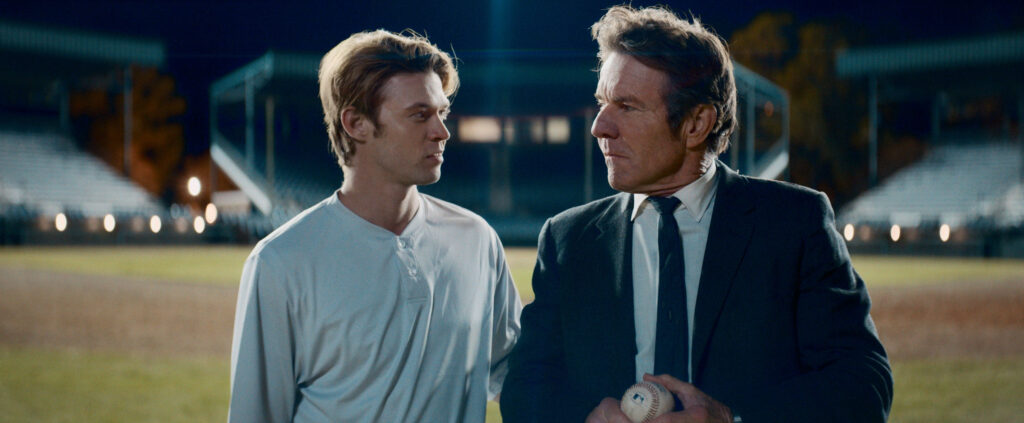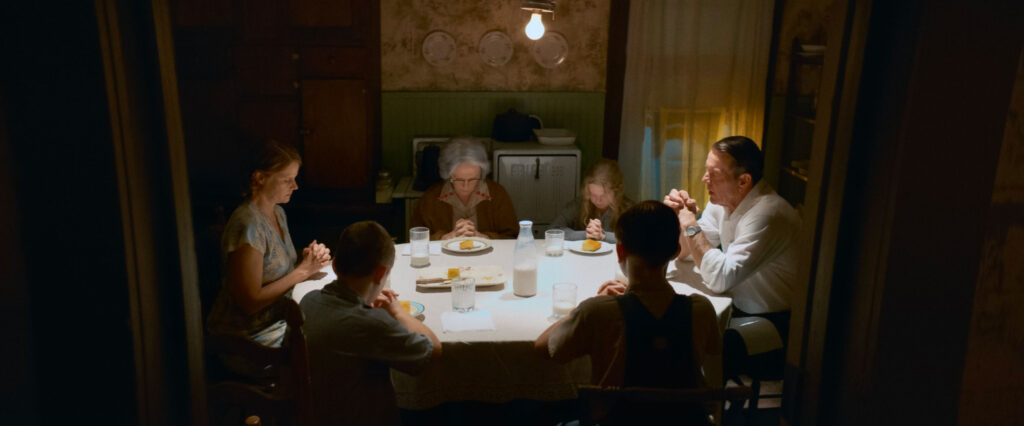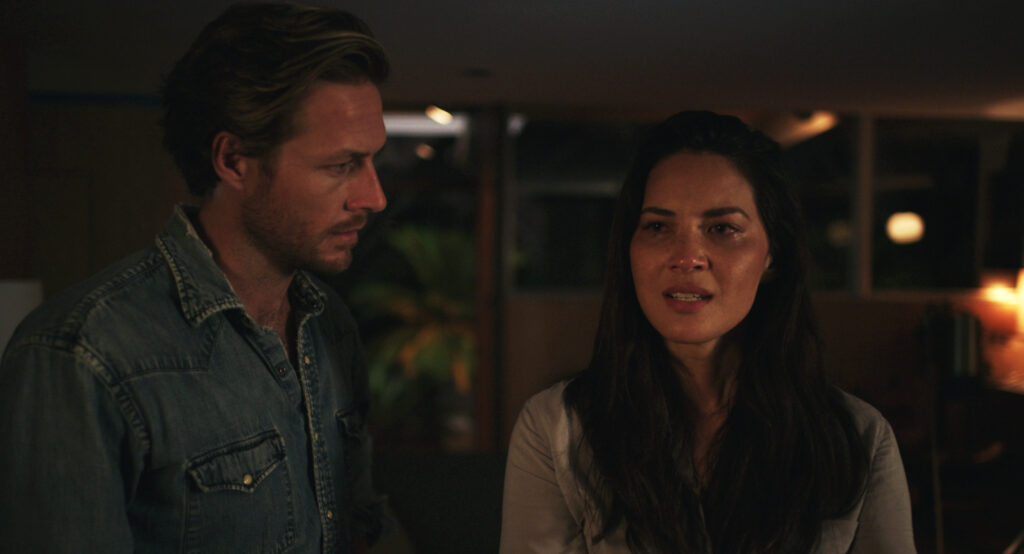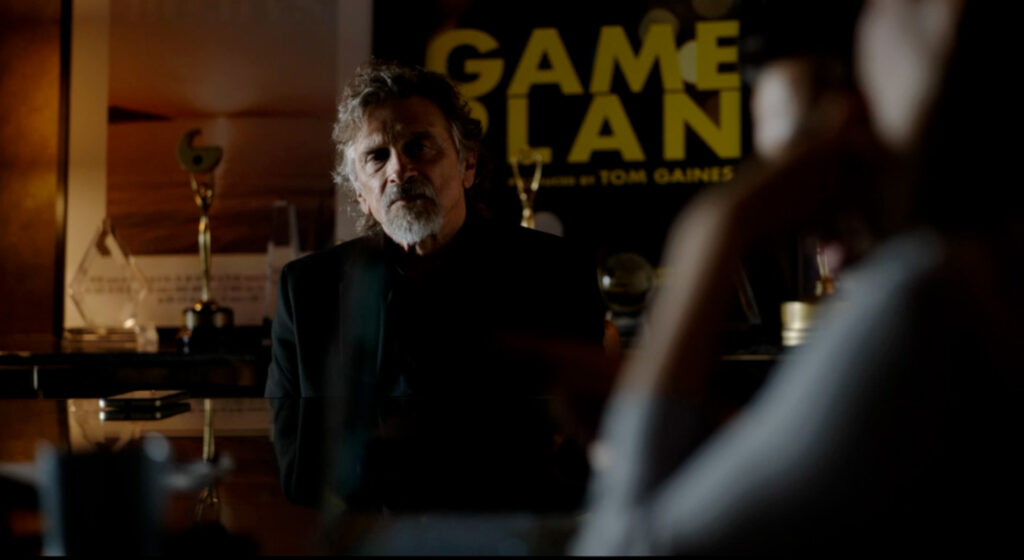August 25, 2023
by Carla Hay

Directed by Jeff Celentano
Culture Representation: Taking place in Texas in 1965 and 1974, the dramatic film “The Hill” (based on the true events) features a predominantly white cast of characters (with some African Americans) representing the working-class and middle-class.
Culture Clash: Rickey Hill faces major difficulties in his goal to play for a Major League Baseball (MLB) team, including a degenerative spine disease, leg disabilities and a conservative pastor father who does everything he can to prevent him from playing baseball.
Culture Audience: “The Hill” will appeal primarily to people who are interested in watching a very unique baseball story turned into formulaic mush.

“The Hill” is a poorly constructed faith-based biopic about disabled baseball player Rickey Hill. This long-winded and preachy drama leaves big questions unanswered about his life. The movie is also plagued with hokey dialogue and corny acting performances. Even though “The Hill” is based on real people and true events, much of this movie looks too much like a fairy tale.
Directed by Jeff Celentano, “The Hill” was written by Angelo Pizzo and Scott Marshall Smith. The movie’s total running time is 126 minutes, but the movie spends the first half spinning its wheels in boring repetition, while leaving out large chunks of Hill’s life, only to fast-forward to another part of his life in the second half and get stuck in more boring repetition. Anyone who knows what happens to Hill in real life before seeing this movie might be disappointed to find out that the most exciting highlights of his career are reduced to being an epilogue in the movie.
Hill was born in Fort Worth, Texas, on August 15, 1956. “The Hill” movie takes place in Texas, in 1965 and 1974. The first half of the movie is about his life when he was 9 years old, while the second half of the movie is about his life when he was 18. The years in between are erased and unexplained in this very flawed and tedious movie.
The movie begins in the small town of Bowie, Texas, where the Hill family is tight-knit but living in near-poverty. (“The Hill” was actually filled in Georgia.) The family patriarch is James Hill (played by Dennis Quaid), a strict and pious Baptist pastor who has a dwindling congregation of working-class people. James can be a loving husband and father, but he’s also very rigid and stubborn in wanting people to do what he thinks is best.
The other members of the family living in the same household are James’ loyal wife Helen Hill (played by Joelle Carter); 9-year-old Rickey (played by Jesse Berry); Rickey’s even-tempered older brother Robert (played by Mason Gillett), who’s about 11 or 12 years old; Rickey’s outspoken younger sister Connie (played by Hailey Bithell), who’s about 7 or 8 years old; and Helen’s pessimistic mother Lillian (played by Bonnie Bedelia, wearing a very bad wig), who is nicknamed Gram.
The movie opens with Rickey, who wears leg braces, practicing playing baseball and perfecting his body swivel so that he can throw the ball without having to strain his legs too much. Viewers later find out that Rickey also has a degenerative spine disease. A neighbor girl named Gracie Shanz (played by Mila Harris) watches Rickey, who tells her, “Girls don’t know spit about baseball.” Gracie, who’s about the same age as Rickey, responds by saying that Rickey won’t play in the major leagues. Gracie also calls Rickey her “boyfriend.”
Gracie’s got her own personal problems. Her father Earl Shanz (played by James Devoti) is an abusive alcoholic. Gracie’s mother/Earl’s wife Carol Shanz (played by Monica Louwerens Kenyon) is passive and is too scared to do anything about Earl’s abuse. The Shanz family members are among the small congregation (less than 50 people) attending the church led by James, who is quite pompous at work and at home.
During a church service, while James is delivering a sermon, he notices that a middle-aged, tobacco-chewing woman named Mrs. Babbitt (played by Taylor St. Clair) is spitting her tobacco juice into a small bowl on the church floor but her spit frequently misses the bowl and is leaving brown tobacco puddles on the floor. Meanwhile, during the same service, Earl is smoking a cigarette. James thinks these actions are very disrespectful in a place of worship.
James stops the sermon to politely ask Mrs. Babbitt and Earl to stop spitting and smoking in the church. Mrs. Babbitt seems annoyed by this request but stops. However, Earl is defiant and keeps smoking. James gets irritated and scolds Earl, by saying: “I am not going to let the Lord’s house by soiled by Satan!” Earl gets up and begins to argue with James in a bullying way. Earl eventually storms out of the church.
Earl isn’t the only congregant who wants to smoke in church, so James knows he could be alienating other members of his congregation with his rule of “no smoking and no spitting in church.” Lillian is quick to warn James that he can’t afford to lose congregants whose donations they need to keep the church running and to provide the Hill family with a steady income. James says he’s willing to take that risk if it means keeping this place of worship as sacred as possible.
At home, around the dinner table, Lillian expresses her disgust that James’ low income can barely feed the family. Rickey also needs an operation that the family can’t afford. Lillian berates James for not having a job that pays more money, while James gets defensive and lectures Lillian by telling her she doesn’t have enough faith in God. Helen tries to keep the peace and doesn’t like to see her mother and husband arguing, but Helen usually sides with James.
James knows that Rickey loves baseball, but James discourages Rickey’s dream to one day play for a Major League Baseball team. In fact, James thinks Rickey shouldn’t be playing baseball at all, because James thinks it will lead to getting Rickey getting seriously injured. Instead, James tries to instill into Rickey that Rickey’s calling in life is to become a pastor, just like James.
One day, Rickey and Robert are playing baseball in open field. Instead of a baseball bat and a ball, Rickey is using a stick and a rock. He hits the rock so hard and far, it breaks a side rear view mirror of an empty car parked dozens of feet away. The car belongs to Ray Clemmons (played by Randy Houser), the owner of a local scrapyard.
Rickey is a very honest boy who believes in confessing to causing this damage and making amends. When Rickey and Robert go over to Ray’s place to tell him what happened and offer to pay for the repairs, Ray is isn’t angry but is impressed with Rickey’s baseball skills. Ray asks Rickey to use the stick to hit the rock again from the same distance. Rickey does it again, this time causing the car’s front window to crack. Because he owns a scrapyard, Ray tells Rickey and Robert that he already has many other car parts that can replace the parts that are damaged.
James has become an unpopular leader in his own church, so the Hill family moves away before James can be officially fired. It’s also implied that they relocated to avoid paying a lot of James’ unpaid bills in the area. With no new home or new job prospects lined up, the Hill family packs up and goes on a road trip to an uncertain future. Rickey and Gracie say goodbye to each other, but you just know from the way this movie is made, Rickey and Gracie will see each other again.
“The Hill” is the type of movie that piles on cornball situation after cornball situation. While driving on a deserted road, the car runs out of gas. And then, the car immediately gets a flat tire. Just as James says out loud that things couldn’t get worse, it starts to rain heavily. The family has a laugh over it, in the way that people laugh when they have nothing left to lose.
An elderly couple named Linda Meyers (played by Judy Leavell) and Josh Meyers (played by Wilbur Fitzgerald) happen to be driving by, and they come to rescue of this unlucky family. Linda and Josh are generous to let the Hill family stay in their home temporarily. James tells Linda and Josh that he’s a pastor. And it just so happens that Linda knows about a church that’s looking for a pastor. Whoever gets the job will also get to live with any family members in a house that’s owned by the church.
James immediately accepts the position before seeing the church and the living quarters. As soon as Linda says that the job has been vacant for a year, you just know that this job is too good to be true. And sure enough, the church and accompanying house are run-down dumps. With no other place to go and no other job offers, James decides he can rebuild the church and the house.
Unfortunately, most of Rickey’s childhood depicted in “The Hill” is a back-and-forth slog of him practicing baseball with Robert in nearby play areas, and Rickey being scolded by James for playing baseball. Rickey is desperate to play on his school’s baseball team, but he needs a signed permission slip from his father. James also gets upset when he sees Rickey has been collecting baseball cards, which James thinks are sinful because they represent “worshipping false idols.”
A teacher at Rickey’s school named Coach Don (as David Marshall Silverman) notices Rickey’s special talent and personally goes over to the Hill household to try to convince James to let Rickey play baseball for the school’s team. However, James stubbornly refuses to change his mind about not giving permission for Rickey to play any baseball. Coach Don, who says he used to be a preacher too, berates James for “crushing” Rickey’s soul and squandering the blessing of Rickey’s athletic talent. There’s more than one scene where James physically punishes Rickey for playing baseball.
“The Hill” also has the expected scenes of Rickey being bullied by other boys, who think he’s delusional for wanting to play baseball. A mean-spirited brat named Quinn (played by Tyler Johnson) is the chief bully. However, several other local boys admire Rickey and are rooting for him to succeed. Robert is also a very loyal brother who protects Rickey from the bullies as much as he can.
James is overly strict but he isn’t a complete tyrant. He is genuinely concerned about Rickey’s health. James clearly has unspoken guilt that he’s powerless to prevent Rickey’s health issues and can’t afford to pay for Rickey’s medical treatment, so James overcompensates by using religion as a way to wield power over his family. After the Hill family finds out that Rickey needs an operation that the family can’t afford, the movie shows the efforts made by the family’s church and other people in the community to raise money for the operation.
The Hill family household is oppressive in many ways, but there’s also a lot of love in the family. A tender scene happens early in the movie when Rickey and Robert go to a local diner to buy one of James’ favorite meals as a surprise gift: a hamburger and a soda, using money that the boys saved up. James is genuinely touched by this loving gesture and shows appreciation for his sons’ thoughtfulness.
For all the time and repetitive effort that “The Hill” puts into showing how much James blocks and discourages Rickey from playing baseball, the movie then does an awkwardly abrupt fast-forward to Rickey (played by Colin Ford) in his last year of high school in 1974. He’s 18 years old and a star player on his school’s baseball team.
What happened during all those years between Rickey being a dejected kid who wasn’t allowed to play baseball to being a star baseball player for his high school? Who coached him during this crucial development period? Rickey being 18 presumably means he no longer needed a parent’s permission to be on a baseball team. But how did he get medical clearance from a doctor to play for his school’s team? Don’t expect “The Hill” to answer any of those questions.
Instead, the last half of the movie drags out with MLB hopeful Rickey wanting to be discovered and chosen for a team during MLB tryouts. And what do you know: Gracie (played by Siena Bjornerud) just happens to have moved to the same area, so now she and Rickey can reunite and fall in love. During this time when Rickey hopes to be recruited to the major leagues, James has refused to watch Rickey play any baseball games. However, Rickey’s mother Helen and siblings Robert (played by Ryan Dinning) and Connie (played by Carina Worm) are supportive spectators at Rickey’s games.
During the MLB tryouts, Rickey catches the eye of MLB scout Red Murff (played by Scott Glenn), who gives very stereotypical tough-but-tender pep talks. And there’s plenty of preaching and praying in “The Hill” too. A lot of this sanctimonious talk ranges from generic to extremely sappy. The baseball game scenes aren’t very interesting, and neither are the acting performances in this bloated biography.
“The Hill” treats Rickey’s medical issues as pesky annoyances. Any excruciating pain he experiences are depicted with some superficial grimaces and groans, some limps and some clutching of his back. There’s a scene in his childhood where Rickey breaks off his leg braces himself and then claims he feels no pain in his legs.
Everything in “The Hills” looks fake, which is a disservice to the real-life physical agony that this talented baseball player experienced. Because the movie ends when Rickey is 18, it cuts off right before the most fascinating part of his baseball journey. Although “The Hill” certainly has an inspirational story, the way that this dreadful dud tells this story is by hollowing it out and replacing a lot of meaningful parts with surface-level preaching and cringeworthy dialogue.
Briarcliff Entertainment released “The Hill” in U.S. cinemas on August 25, 2023.


